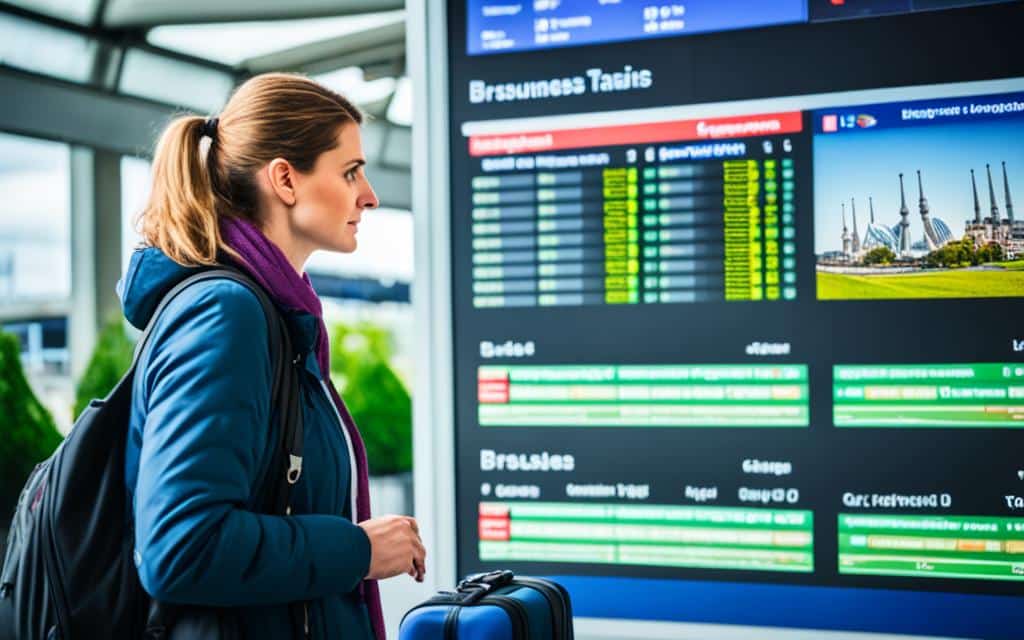Welcome to our guide on relocating to Belgium for business. If you’re considering expanding your operations or starting a new venture in Belgium, this article will provide you with valuable information and insights to make your relocation process smooth and successful.
Belgium offers a strategic location in the heart of Europe, making it an ideal destination for businesses looking to access the European market. With its strong economy, excellent infrastructure, and highly skilled workforce, Belgium provides ample opportunities for growth and success.
Whether you’re a small startup or a multinational corporation, relocating to Belgium can be a transformative decision. However, the process can be complex and overwhelming without proper guidance. That’s where we come in!
In this comprehensive guide, we will walk you through the essential aspects of relocating to Belgium for business. From visa requirements to finding accommodation and understanding the healthcare system, we’ve got you covered.
So, whether you’re dreaming of opening a new office in Brussels or expanding your business to Antwerp or Ghent, let’s dive in and explore what Belgium has to offer. Get ready to embark on an exciting journey of business opportunities, cultural experiences, and success in the heart of Europe.
Visa requirements for relocating to Belgium
If you are considering relocating to Belgium for business, it is important to understand the visa requirements and immigration procedures involved. In this section, we will provide you with valuable information on the different types of visas available, the application process, and any specific requirements for business immigration.
Belgium offers various visa options for individuals intending to move to the country for work purposes. The type of visa you will need depends on factors such as the duration and nature of your employment in Belgium.
Types of Visas
There are several visa categories relevant to business professionals and entrepreneurs:
- Work Permit – This visa is required for individuals who have secured a job or are employed by a Belgian company.
- Business Visa – For short-term business visits or attending conferences, seminars, or meetings.
- Investor Visa – Designed for individuals wishing to invest in a Belgian business.
It is crucial to carefully review the specific requirements and limitations associated with each visa category to ensure you select the one that suits your needs best.
Application Process
The visa application process for relocating to Belgium can be complex, so it is essential to begin the process well in advance of your planned move. You will need to gather supporting documents, complete application forms, and schedule an appointment at the Belgian embassy or consulate in your home country.
During the application process, you may be required to provide documents such as a valid passport, proof of employment or business ownership, financial statements, and medical insurance coverage.
It is advisable to consult with an immigration lawyer or expert to ensure that your application is accurate, complete, and in compliance with the visa requirements.
Business Immigration
If you are planning to start a business in Belgium, additional requirements and procedures will apply. Belgium has specific programs aimed at attracting foreign entrepreneurs, such as the Start-up Visa and the Professional Card. These programs may include criteria related to business plans, investment amounts, and job creation.
Understanding the visa requirements and procedures for business immigration is crucial for a successful relocation to Belgium. By following the proper steps and providing the necessary documentation, you can ensure a smooth transition and legally establish your presence in the country.
Finding accommodation in Belgium
When relocating to Belgium for work, finding suitable accommodation is a top priority. Fortunately, Belgium offers a range of housing options to cater to the diverse needs of expats. Whether you prefer renting or buying property, there is something for everyone.
If you are looking for temporary accommodation or prefer the flexibility of renting, Belgium has a variety of rental properties available. You can choose from apartments, townhouses, or even individual rooms in shared flats. The rental market offers a range of sizes and styles to suit different budgets and preferences.
On the other hand, if you’re considering a long-term commitment and want to invest in property, buying a house or apartment in Belgium can be a rewarding option. It’s important to research the specific region and city where you plan to settle, as property prices, availability, and regulations can vary.
It’s worth noting that the cost of living in Belgium can vary depending on the city or region. Brussels, as the capital city, tends to have higher prices compared to other cities such as Antwerp or Ghent. It’s advisable to consider your budget and lifestyle preferences when choosing where to live.
Tips for Finding the Perfect Accommodation
- Start your search early to have a wider range of options.
- Utilize online platforms and local real estate agencies to explore available properties.
- Consider the proximity to your workplace and other amenities.
- Take into account public transportation options if you prefer not to drive.
- Factor in additional costs such as utilities, maintenance fees, and property taxes.
By considering these factors and following these tips, you can find the perfect accommodation in Belgium that suits your needs and preferences. Whether you choose to rent or buy, Belgium offers a variety of housing options to make your relocation smooth and comfortable.
Healthcare in Belgium for expats
When relocating to Belgium, it’s essential to have a comprehensive understanding of the healthcare system and how it caters to expats. Belgium is renowned for its high-quality medical services and commitment to providing accessible healthcare for all residents.
Obtaining expat health insurance
One important aspect of healthcare in Belgium for expats is obtaining the right health insurance coverage. While access to public healthcare is available for all residents, having expat health insurance provides additional benefits and peace of mind.
Expat health insurance ensures that you have access to a wide range of medical services, and it covers any potential medical expenses you may incur during your time in Belgium. Whether it’s routine check-ups, specialist consultations, or emergency care, having the right insurance coverage ensures that you receive the necessary healthcare without any financial strain.
Quality healthcare services
Belgium is home to world-class medical facilities and highly skilled healthcare professionals. The country’s hospitals are equipped with state-of-the-art technology and offer a comprehensive range of medical services, from preventive care to specialized treatments.
Expats can expect prompt and efficient healthcare services in Belgium. The country has a strong emphasis on patient care, and medical professionals prioritize the well-being of their patients. Whether it’s a routine visit to a general practitioner or a complex medical procedure, expats can rely on the expertise and professionalism of the Belgian healthcare system.
Considerations for expats
When seeking healthcare in Belgium as an expat, it’s important to understand the local healthcare practices and any specific considerations. The healthcare system operates on a social security model, which means that residents contribute to a national health insurance scheme through their taxes.
Expats are generally required to register with a local health insurance fund, which provides coverage for medical expenses. It’s advisable to familiarize yourself with the different health insurance options available for expats and choose a plan that suits your specific needs and preferences.
Additionally, it’s recommended to research and identify healthcare facilities and professionals in your area of residence to ensure convenient access to quality healthcare services whenever needed.
Overall, Belgium’s healthcare system offers exemplary medical care to expats, with a strong emphasis on accessibility and quality. By having the right health insurance coverage and understanding the local healthcare practices, expats can enjoy peace of mind and prioritize their well-being while living and working in Belgium.
Settling in Belgium: Cultural considerations
When relocating to Belgium, it’s important to understand and appreciate the cultural differences you may encounter. From language and social norms to business etiquette and the overall expat experience, embracing Belgian culture will help you settle in smoothly and make the most of your time in this vibrant country.
Language
Belgium is a multilingual country, with three official languages: Dutch (Flemish), French, and German. The language spoken in the region you are relocating to will depend on its location and local customs. Learning a few basic phrases in the local language can go a long way in building rapport with locals and making daily interactions more enjoyable.
Social Norms
Belgians value politeness and courtesy, so it’s important to show respect in all your interactions. When meeting someone for the first time, a handshake and maintaining eye contact are considered appropriate. Making an effort to understand and adhere to local social norms will make it easier for you to build relationships with colleagues and neighbors.
Business Etiquette
Business etiquette in Belgium is formal, with punctuality being highly valued. It’s customary to address individuals using their professional titles. During business meetings, it’s important to be well-prepared and maintain a professional demeanor. Building trust and establishing long-term relationships is key in the Belgian business landscape.
The Expat Experience
Living as an expat in Belgium offers a unique experience that combines European charm with a cosmopolitan lifestyle. Embracing the local culture, cuisine, and traditions will enrich your time in the country. Belgium offers a vibrant expat community, providing opportunities to meet like-minded individuals and engage in various social and cultural activities.
Integrating into Belgian society may take time, but the warmth and friendliness of the locals will make the journey worthwhile. Keep an open mind, embrace the cultural differences, and seize the opportunities that arise while settling into your new expat life in Belgium.
Navigating the Belgian business landscape
When considering starting a business in Belgium, understanding the Belgian business environment is crucial. Belgium offers numerous opportunities for entrepreneurs and investors, but it also presents unique challenges. This section will provide valuable insights into the Belgian business landscape, covering important aspects such as starting a business, business opportunities, and local regulations.
Starting a business in Belgium is a straightforward process, thanks to the efficient and well-structured business registration system. Whether you are a local or foreign entrepreneur, you can easily establish your business by following the necessary steps.
Belgium’s strategic geographic location within Europe makes it an ideal hub for international trade. Its strong economic ties with neighboring countries and access to a highly skilled workforce contribute to a thriving business environment. The country is home to several multinational corporations and offers a supportive infrastructure for startups and small businesses.
Business opportunities abound in Belgium, particularly in sectors such as technology, manufacturing, logistics, and finance. The country’s focus on innovation and sustainability creates an environment conducive to growth and development. Startups and entrepreneurs can tap into various funding opportunities and benefit from networking events and incubators.
It is important to familiarize yourself with the local regulations and legal framework when doing business in Belgium. Understanding tax obligations, labor laws, and intellectual property rights will ensure compliance and protect your business interests. Consulting with legal and accounting professionals experienced in the Belgian market can help navigate the intricacies of the regulatory landscape.
In addition to governmental support, Belgium boasts a robust support network for entrepreneurs. Organizations such as Belgian Chambers, Startups.be, and various business associations provide resources, mentorship, and networking opportunities. Building relationships within the business community can significantly enhance your chances of success.
The key points to remember when navigating the Belgian business landscape:
- Starting a business in Belgium is a straightforward process.
- Belgium offers a favorable business environment with access to a skilled workforce.
- The country presents a multitude of business opportunities, particularly in technology, manufacturing, logistics, and finance.
- Understanding and complying with local regulations is essential for business success.
- Engaging with the local support network can provide valuable resources and guidance.
By understanding the Belgian business environment, entrepreneurs can make informed decisions and seize the numerous opportunities available. With the right knowledge and support, starting a business in Belgium can lead to success and growth within this vibrant and diverse market.
Conclusion and final tips for relocating to Belgium
Relocating to Belgium for business can be a rewarding experience, but it requires careful planning and preparation. Throughout this article, we have covered important aspects such as visa requirements, finding accommodation, healthcare, cultural considerations, and navigating the Belgian business landscape. As you embark on your relocation journey, here are some final tips to ensure a smooth transition:
1. Network and connect: Building a strong network of contacts in Belgium is essential for both personal and professional growth. Attend industry events, join local business groups, and make an effort to meet new people. The connections you make can open doors to opportunities and valuable insights.
2. Learn the language: While many Belgians speak English, learning the local languages (French, Dutch, or German depending on the region) shows respect for the culture and enhances your integration. There are language learning resources available online and in-person classes to help you get started.
3. Seek assistance: Relocating to a new country can be overwhelming, so don’t hesitate to seek assistance from relocation experts or professional services tailored to expats. They can provide guidance on legal matters, housing options, and cultural integration, making the transition smoother and less stressful.
With these tips in mind, you are well-equipped to embark on your journey of relocating to Belgium for business. Embrace the opportunities that await you and enjoy the rich cultural heritage, vibrant business environment, and high quality of life this beautiful country has to offer. Safe travels!













